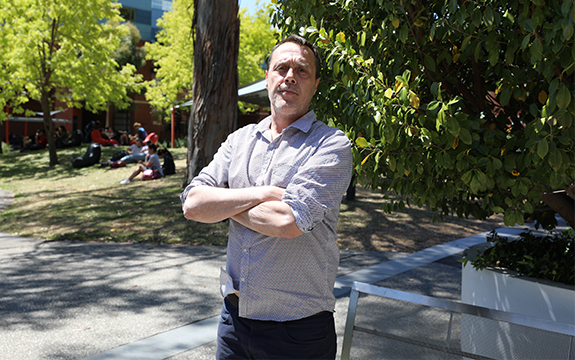Swinburne creates new role to embed Indigenous knowledges into curriculums

In Summary
- Gundtijmara man and distinguished academic and Indigenous education teacher, Mat Jakobi, has been appointed as Swinburne’s inaugural lecturer in Indigenous Cultural Capabilities
- Mr Jakobi will support Swinburne’s teaching and learning staff in the decolonising and indigenising of Swinburne’s curriculums
- Mr Jakobi is helping Swinburne develop a cultural capabilities module to be rolled out to all undergraduate students from 2020
Swinburne has appointed Gundtijmara man, distinguished academic and Indigenous education teacher, Mat Jakobi, as its inaugural lecturer in Indigenous Cultural Capabilities.
“I’m really excited to be working with my teaching colleagues across the university in both higher education and pathways and vocational education sectors, thinking about what Indigenous knowledges might look like in their curriculums,” says Mr Jakobi.
Mr Jakobi will support Swinburne’s teaching and learning staff in the decolonising and indigenising of Swinburne’s curriculums, helping staff incorporate Indigenous knowledges and perspectives into the objectives, learning outcomes and delivery of courses.
“I’m helping various teams walk through learning material to decide how we want to present Indigenous knowledges and narratives, how we want to write curriculum, and how we transmit and teach the content,” he says.
Building students’ cultural capability
Mr Jakobi is also helping Swinburne develop a new cultural capabilities module to be rolled out to all undergraduate students from 2020.
“There are four mini-modules where students explore the definitions of cultural capability, their responsibilities as Swinburne students under our Reconciliation Action Plan, and their responsibilities as students of the 21st century,” says Mr Jakobi.
“These modules, and the wider work we are doing throughout the university, is really important. It’s transforming mindsets by turning any nervousness into enthusiasm,” he says.
Mr Jakobi says working in the Moondani Toombadool Centre, Swinburne’s centre for Indigenous issues and student support, with both Indigenous and non-Indigenous colleagues is rewarding.
“As a team, we understand that staff need to know what reconciliation actually looks like in their own teaching environment. My work helps non-Indigenous staff understand that through reconciling their professional knowledge with their professional practice, we all move closer towards grounding and localising Indigenous knowledges.”
Embracing teaching and learning
Growing up in the Victorian towns of Ballarat and Horsham on Wathaurong country, Mr Jakobi was 19-years-old when he started an internship at a local primary school. This sparked his passion for education and, soon after, Mr Jakobi completed his Bachelor of Arts (Primary Education).
Mr Jakobi then worked as a primary school teacher throughout Victoria, Queensland and northern Australia, teaching in diverse communities and populations.
During this time, he also completed a Bachelor of Fine Arts and Master of Education.
Mr Jakobi's experience and influence across the education sector is diverse. He joins Swinburne after making significant contributions at Deakin University and Victoria University, leading the implementation of Aboriginal and Torres Strait Islander peoples, places and perspectives in teaching and learning units.
Mr Jakobi commends Australian universities for actively seeking Aboriginal and Torres Strait Islander peoples to develop curriculums that include Indigenous standpoints.
“The best part is working together with non-Indigenous academic and professional staff, and watching them realise and share in the responsibility of indigenising professional practice,” he says.
Swinburne’s vision for reconciliation
Swinburne was the first Australian university to achieve elevate status for its 2017-2019 Reconciliation Action Plan (RAP). Specifically, by implementing a RAP, Swinburne has moved closer toward its vision of cultural capability and a university environment where Aboriginal and Torres Strait Islander peoples, their heritage, knowledges, cultures and spirituality are valued and celebrated.
Since implementing a RAP, the university has carried out a number of initiatives to embed reconciliation and Indigenous knowledges and perspectives within the organisation, including:
- The Swinburne Annual Reconciliation Lecture to advance understandings in the wider community about reconciliation
- Indigenous Studies minors and majors for students, examining both past and present experiences of Indigenous peoples
- A collaboration with Diploma of Interior Design and Decoration students to design Swinburne’s new Moondani Toombadool Centre and an Indigenous student space
- Doors 2 Jobs, a trades program delivered in the Northern Territory by Swinburne’s Department of Trades and Engineering Technologies.

